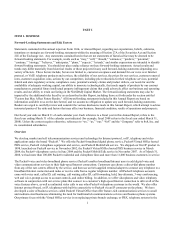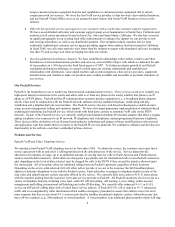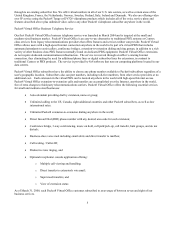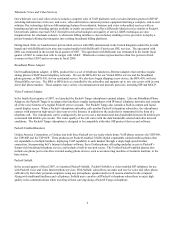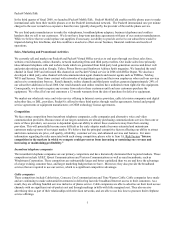8x8 2008 Annual Report Download - page 13
Download and view the complete annual report
Please find page 13 of the 2008 8x8 annual report below. You can navigate through the pages in the report by either clicking on the pages listed below, or by using the keyword search tool below to find specific information within the annual report.11
established in the Disability Access Order were scheduled to become effective on October 5, 2007, and as of this date, we
began to remit TRS fund contributions and have implemented 7-1-1 abbreviated dialing which connects all of our customers to
California relay service operators. The FCC granted a limited waiver of the 7-1-1 call handling requirement. While still
mandating that interconnected VoIP providers like us are required to transmit 7-1-1 calls to a relay center and to contribute to
the TRS fund, the FCC waived the requirement, until March 31, 2009, insofar as it requires such providers to transmit the 7-1-1
call to an “appropriate relay center,” meaning the relay center(s) serving the state in which the caller is geographically located
or the relay center(s) corresponding to the caller’ s last registered address. As of April 5, 2008, we have implemented a 7-1-1
system which routes such calls to the appropriate relay center based upon the telephone number assigned to the telephone
placing the 7-1-1 call.
On August 6, 2007, the FCC released a Report and Order concerning the collection of regulatory fees for Fiscal Year 2007
("Regulatory Fees Order"), which, for the first time, mandates the collection of such fees from interconnected VoIP service
providers like us. The Regulatory Fees Order requires that interconnected VoIP providers pay regulatory fees based on reported
interstate and international revenues. The Regulatory Fees Order became effective in November 2007. Regulatory fees for the
FCC's Fiscal Year 2007 will be due in 2008 during a separate filing window yet to be determined. Fiscal Year 2008 fees are
paid during the normal regulatory fee payment window. The assessment of regulatory fees on our service offering will increase
our costs and reduce its profitability or cause us to increase the retail price of our service offerings.
On November 8, 2007, the FCC released a Report and Order concerning Local Number Portability ("LNP Order"). The LNP
Order imposes local number portability and related obligations on interconnected VoIP Providers. The obligations require
interconnected VoIP providers to contribute to shared numbering administration costs on a competitively neutral basis. The
assessment of local number portability fees to our service will increase our costs and reduce our profitability or cause us to
increase the price of our retail service offerings. The LNP Order also requires us to port telephone numbers within certain
timeframes. We believe that we can conform to these standards but we are reliant on our carrier partners to process and to
accomplish ports. We could be subject to informal or formal complaints filed with either the state public utilities’ commissions
or with the Federal Communications Commission if we fail to process ports within industry established guidelines. Other
carriers or consumers could also sue us in state or federal court should we fail to comply.
On October 5, 2007, the FCC granted Visit, Inc., a California corporation that is a wholly owned subsidiary of the Company,
an international telecommunications certificate with authority to provide global resale service in accordance with section
63.18(e)(2) of the Commission’ s rules.
The effect of any future laws, regulations and the orders on our operations, including, but not limited to, the Packet8 service,
cannot be determined. But as a general matter, increased regulation and the imposition of additional funding obligations
increases service provision costs that may or may not be recoverable from our customers, which could result in 1) making our
services less competitive with traditional telecommunications services if we increase our retail prices or 2) decrease our profit
margins if we attempt to absorb such costs.
Regulation of the Internet
In addition to regulations addressing Internet telephony and broadband services, other regulatory issues relating to the Internet
in general could affect our ability to provide our services. Congress has adopted legislation that regulates certain aspects of the
Internet, including online content, user privacy, taxation, liability for third-party activities and jurisdiction. In addition, a
number of initiatives pending in Congress and state legislatures would prohibit or restrict advertising or sale of certain products
and services on the Internet, which may have the effect of raising the cost of doing business on the Internet generally.
Federal, state, local and foreign governmental organizations are considering other legislative and regulatory proposals that
would regulate and/or tax applications running over the Internet. We cannot predict whether new taxes will be imposed on our
services, and depending on the type of taxes imposed, whether and how our services would be affected thereafter. Increased
regulation of the Internet may decrease its growth and hinder technological development, which may negatively impact the cost
of doing business via the Internet or otherwise materially adversely affect our business, financial condition and results of
operations.


